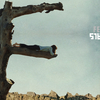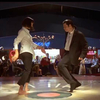Josefin Öhrn And The Liberation have been gradually making a name for themselves since the release of 2014's debut EP Diamond Waves. Essentially the brainchild of Stockholm-based duo Josefin Öhrn and Fredrik Joelson, with various band members fluctuating between recording and tour schedules, their first album Horse Dance came out to a wave of critical acclaim while 2016's follow-up Mirage received even wider praise culminating in a composer of the year award for Öhrn at last month's Manifest Awards, the Swedish independent equivalent of the BRITs or the Grammys.
With the band currently embarking on their biggest UK headline tour to date, DiS caught up with Öhrn and Joelson prior to their show at Nottingham Contemporary.
Tonight is the first British date of the tour. Are you excited to be back over here playing to UK audiences?
Josefin Öhrn: I'm really excited. We haven't played that much in the UK before so I'm really happy that people are coming to the shows.
Do you think your music resonates more with UK audiences than other parts of the world?
JÖ: In some ways, I think so. The UK has a strong tradition of live music and so many great psychedelic rock bands.
Fredrik Joelson: That's really true actually.
JÖ: It's much bigger than in Sweden for example. Sweden is such a small country.
FJ: Holland's been great, and we played a couple of festivals in Germany that were great as well. But British audiences have been the best by far.
Your music reminds in parts of people like Stereolab and Broadcast. Were they a big influence in forming the band?
JÖ: Yeah, they were.
FJ: I've listened a lot to Stereolab, and Broadcast are just amazing.
You played Liverpool Psych Fest last September, which was the first time I saw your band play. Do you tailor the sets depending on the audiences where you're playing?
FJ: A little bit. For instance, we played Lunar Festival in Tamworth last summer and the set was slightly different to the one at Liverpool.
JÖ: We like to feel the atmosphere and communicate with the audience. Get in sync with them if we can.
FJ: Liverpool and Lunar were both great in different ways. I'd definitely like to play at Lunar again. It's a lovely little festival, plus they had the amazing Cherrystones as DJ who is with us right now.
A lot of your music sounds very improvised. How does the songwriting process develop? Does the music come first or is it developed around the lyrics?
JÖ: It's very different from time to time. Sometimes we have a beat then the lyrics and melody come afterward. Other times it can be the exact opposite.
FJ: Some songs we've had the lyrics first, like 'Sunny Afternoon' for example. That had the lyrics first or at least a vague idea of them. Another where we had the lyrics before we wrote any music was 'Diamond Waves' off an EP we released three years ago.
Many of your songs do seem to take on a new lease of life when played live compared to the recorded versions. Is that something you've always aimed for with the live show?
FJ: This album has a lot of layers compared to the first one, and it feels like we're approaching that with how we play live now. We used to have a lot of motorik beats before whereas now I think it's a lot more fluid.
A lot of Mirage was written on the road. Do you tend to write more while touring?
JÖ: Sometimes the melodies just pop up and then other times we have to sit down and focus.
FJ: I tend to get stuck in and jam a lot of ideas out. Add distortion or whatever and see how it comes out. But then we also tend to shorten a lot of songs too. Some of them start off really long so we have to make them more... accessible.
How do you decide which bits to cut out?
JÖ: We really like The Beatles song structures. The ones that have a chorus and a bridge, so we try to incorporate those into our songs.
FJ: But then we also like Wooden Shjips as well. It depends on our state of mind at the time. I can also get really bored with songs that are just drawn out for the sake of it. We're quite relentless. The initial writing of these songs was really fast.
JÖ: I think it's about dynamics.
It's interesting you say that as the songs on Mirage do seem more traditional in a pop sense than those on Horse Dance. Was that something you deliberately aimed for?
JÖ: I think so.
FJ: As long as it maintains some sort of contradictory dream logic to it in altered states. Because even in altered states I find different narratives depending on whatever state you're in. It's interesting because we're really into melody.
What inspired the lyrics of songs like 'In Madrid' and 'Sister Green Eyes'?
JÖ: A lot of what I write is about what's going on around me at the time. It's very much like a snapshot of a moment in time.
Mirage came out very soon after the release of Horse Dance. Are you quite prolific when it comes to writing songs? Are you writing and/or playing any new material on this tour?
JÖ: We're writing a few bits at the moment.
FJ: But there won't be anything in the set on this tour. We have a couple of new band members who haven't played with us before tonight - Rory Attwell who plays in Warm Brains and Parlour and Angela 'Maki' Won-Yin Mak who also plays in Parlour and a band called Whyte Horses.
If you had the benefit of hindsight is there anything you'd do differently in terms of how either Mirage or Horse Dance would be?
JÖ: With a creative project you could go on forever but we had to work to a deadline so some of the rough edges could be cut off I guess.
FJ: We play a lot of music live or when we're rehearsing so it's difficult to filter all that out in the studio. Both Morgan Delt records mean a lot to us and if you listen to them they're really out there. We're really influenced by people who communicate in a narrative way. I just find it more interesting for myself to write short songs.
Has the way you write changed much from when the band first started?
JÖ: No. I think it's very much about what we're going through in our lives.
FJ: Both of us lived abroad before we knew each other and that's had a major influence on what we write about.
Whereabouts are you based at the moment?
FJ: We're about to be fully based in the UK. We're still kind of based in Stockholm, but we're moving to London soon.
What made you choose London?
JÖ: I think we've just been in one place too long.
FJ: We're not really cut out for that. Scandinavia is great but it's time for a change.
What's the scene like in Stockholm at this present moment in time?
FJ: It's funny because a lot of our favourite Swedish bands like Goat, The Exorcist and Soundtrack Of Our Lives are from Gothenberg. Whereas Stockholm is pretty hard to describe at the minute. Both Gothenberg and Malmo are a bit rough and I think that's why people there are quite creative.
JÖ: There are people making music in Stockholm but there aren't that many venues to play or listen to music.
FJ: We don't really see that many bands in Stockholm. There is no scene as such.
Had you been planning to move away from Stockholm for a while?
FJ: No. I don't think so.
JÖ: It is quite common for people to move away to other parts of Europe.
FJ: I really love the countryside. I'm from the west coast of Sweden which is really far north, whereas Josefin is from Stockholm. I love it out there. I like it more than other parts of Europe. Maybe that makes me a lot rougher than most Swedes. Somehow! I guess a lot of us have the urge to leave our hometowns, home country and gravitate somewhere else.
JÖ: I've always been a nomad. As a kid, it was the best thing I knew. I get restless being stuck in one place too long.
How did the band get together? Do you have different touring members dependent on where you're playing at the time or is there a permanent line-up?
JÖ: It's been the two of us from the start, and then we've had various musician friends who've played at different times. Everyone brings their own energy to the band.
FJ: We met at this after hours party in a record store in Stockholm. Then we just hit it off and became close friends and ended up going travelling together in an old car. We lived by the Mediterranean in the car for a while then we ended up in southern Spain.
JÖ: We had this mixtape we were listening to all the time.
FJ: Tonight will be interesting as it's the first time Rory and Maki have played with us.
JÖ: They're both really good guitarists.
FJ: It's great to have someone singing a female harmony with Josefin as well.
What made you start making music together?
FJ: I heard these amazing recordings Josefin had done.
JÖ: I was studying at art school. Just trying out different things. Film, photos, painting, and then I got onto sound. So I wrote these two songs and made a demo.
Was it always your intention to play in a band at some point?
JÖ: No. It felt like a big experiment. I just wanted to see what happened when I wrote these ideas down.
FJ: We started recording with our friends. One of them from Soundtrack Of Our Lives has this amazing studio, so we recorded there. Then we started our own label and put stuff out there first and ended up getting a lot of gigs off the back of that.
You recently won the composer of the year at the Manifest Awards. How did that feel?
JÖ: It was so unexpected! I hadn't thought about it at all.
FJ: We were really far from the stage when they announced the prize.
JÖ: Because we took so long to collect it the presenters didn't think we were there!
FJ: We hadn't seen a lot of the people that played on the record for a while. So we just took the evening as a reason to get together and have a good time. We all met quite early in the day so we were already in good spirits and then they announced we'd won and we were like... what?
JÖ: Fredrik was just laughing! I just wanted to thank everyone who'd worked on the record. The people we recorded with in the studio etc.
FJ: It was amazing because we felt like black sheep with the music we were making. We don't really hang out with many of the people there or discuss the same topics as them. We live very much by night.
Do you see an award like that raising the band's profile and potentially opening more doors where the music industry is concerned?
JÖ: I don't know how that works really. I've never really thought about it.
FJ: We're really happy to do this tour. It's amazing for us to be able to play in places like Nottingham and Liverpool.
You're signed to Rocket Recordings. How did you get involved with the label?
FJ: They heard some of our music through our agent who also looks after Goat. He introduced us to the label.
Are there any bands you'd recommend Drowned In Sound and its readers should check out?
FJ: I haven't listened to that much new music lately. I'm listening to a lot of old folk music at the minute. A lot of Indonesian music as well.
JÖ: I really like Anna Von Hausswolf. She's really good, and I also heard a song by this band called Slowgold which I really liked. I also love Hills.
FJ: Hills are amazing! Actually, there is so much great music around at the moment. A lot of what Fuzz Club are doing for instance. Also because of the political climate, I think it will influence a lot of interesting music going forwards.
Has the current political climate and recent rise of wing politics had an impact on your songwriting?
FJ: I think it has. It's definitely pushed us that bit further. One thing that's central to us is don't trust your political system. You've got to look for your own, and there's so much tradition whether it be poets or composers or mystics to detach themselves from. The church plays quite an important part in the political system in Sweden but it's not the whole truth, because people are still miserable.
What advice would you give to new bands just starting out?
FJ: Just write and write and write. Put things out. Don't worry about when to do it, just do it.
For more information on Josefin Öhrn And The Liberation, please visit their official website.






















